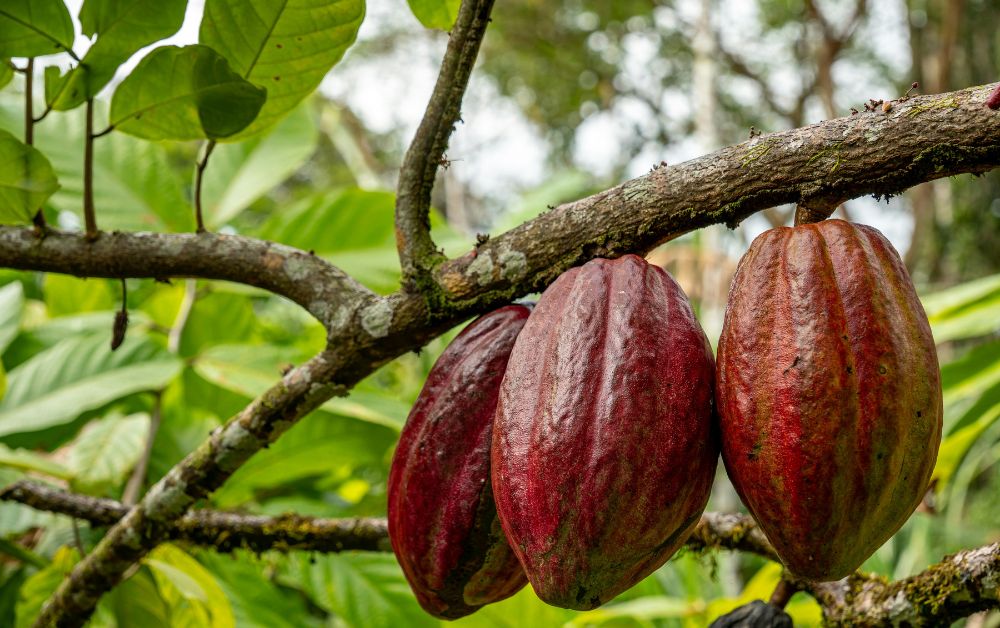And now that we have your attention, you’re invited to dive into a future scenario with us to build your team’s strategic imagination (and to make sure we never run out of chocolate.)
Scenario thinking is the fastest way to build this muscle: leap into a plausible future, unpack its impact on your work, then carry the insights back to guide decisions today.
The cacao tree, the source of all our chocolate, thrives under very specific conditions primarily along a narrow band near the equator. This tree’s delicate existence is under threat from both external environmental factors and human intervention.
Climate changes, increased humidity, and the persistence of various diseases and fungi, along with exploitation of labour and geopolitical instability, make the cacao crop one of the most vulnerable.
This vulnerability doesn’t just threaten our taste buds but endangers the livelihood of millions engaged in the chocolate supply chain, from farming to distribution. There is a very real possibility of living in a world without chocolate.
The stakes are high, but all hope isn’t lost.
By rallying behind the farmers, ensuring they aren’t driven to deforestation for cultivation, and promoting sustainable farming practices, we can make a difference.
Supporting cutting-edge genetic research can pave the way for disease-resistant cacao trees. We can even look for genetic enhancements and replacements for cacao. As consumers, we play a role, including championing fair trade and sustainability initiatives. We can ensure that future generations still get to experience the joy of natural chocolate.

The potential loss of chocolate is a stark reminder of the broader implications of climate change, unsustainable farming practices and deforestation, highlighting the delicate balance between agriculture, sustainability, and consumer demands.
Implications to consider:
- Environmental Balance: Unsustainable farming practices might offer short-term gains but can irreparably damage the ecosystem.
- Livelihoods at Risk: Beyond how chocolate consumers might feel about it, the demise of chocolate would impact the economic well-being of millions of people involved in its cultivation and production.
- We need more awareness about the impacts of climate change and deforestation on chocolate production (as well as other resources in danger of depletion), encouraging responsible consumption and support for fair trade practices.
Discussion questions for your team:
- If chocolate were to become a rare luxury, what would the broader implications be for global agriculture and consumer culture?
- How can consumers actively participate in ensuring the sustainability of their favourite products, beyond just making a purchase?
- Are there other resources facing similar threats? Do any of these affect your organisation directly?
- How could a sustainability mindset impact your industry?
Here’s how you can use this future scenario with your team:
- Forward this email to each of your team members and ask them to read through the above scenario, and to think about the implications for their life, your business, their community and the world.
- You’re welcome to share this video with them too.
- Schedule a discussion time with the team – ideally allocating around 10 minutes at the start of a regular team meeting. Lead with a quick summary of the scenario and use the discussion questions (above) to guide the conversation.
- Keep scenario discussions short. If the energy is high, let the exchange flow but cap it at 15 minutes, parking any deeper debate for a later meeting so that the exercise stays a short, sharp, and enjoyable prompt rather than a strategy workshop.
- The aim isn’t to forecast the future but rather the opportunity to give your team a regular opportunity to imagine a world that doesn’t yet exist, and to allow those thoughts to spark ideas about what you can do differently and creatively in your world today.
If you would like access to our full library of 25 future scenarios just like this one, contact us, we’ll be happy to send a copy your way.
Alternatively, I’ll be happy to answer any questions you might have on how our team uses future scenarios in the strategy sessions we do with our clients around the world.
Here’s to a future that never involves a world with no chocolate!


